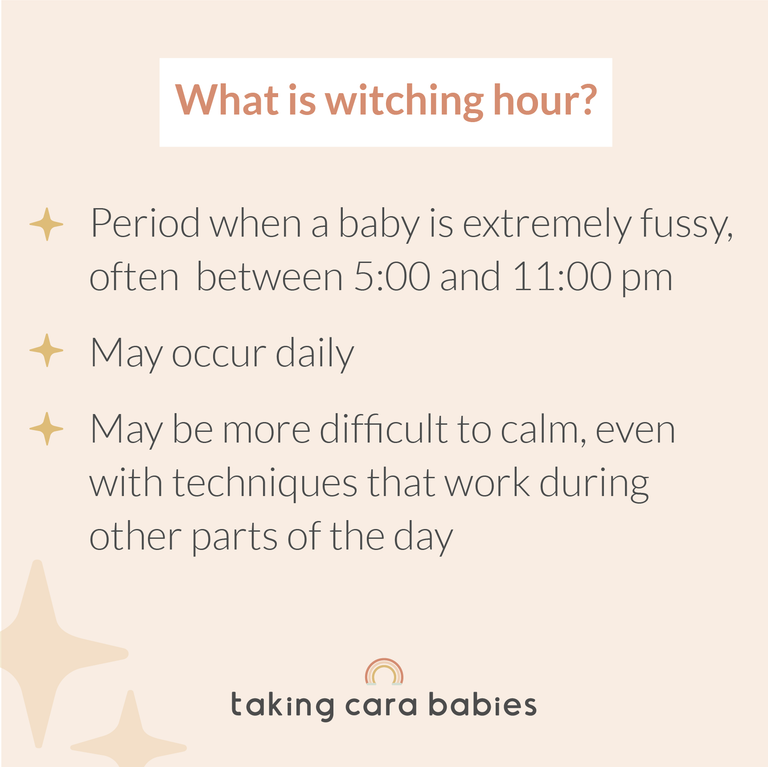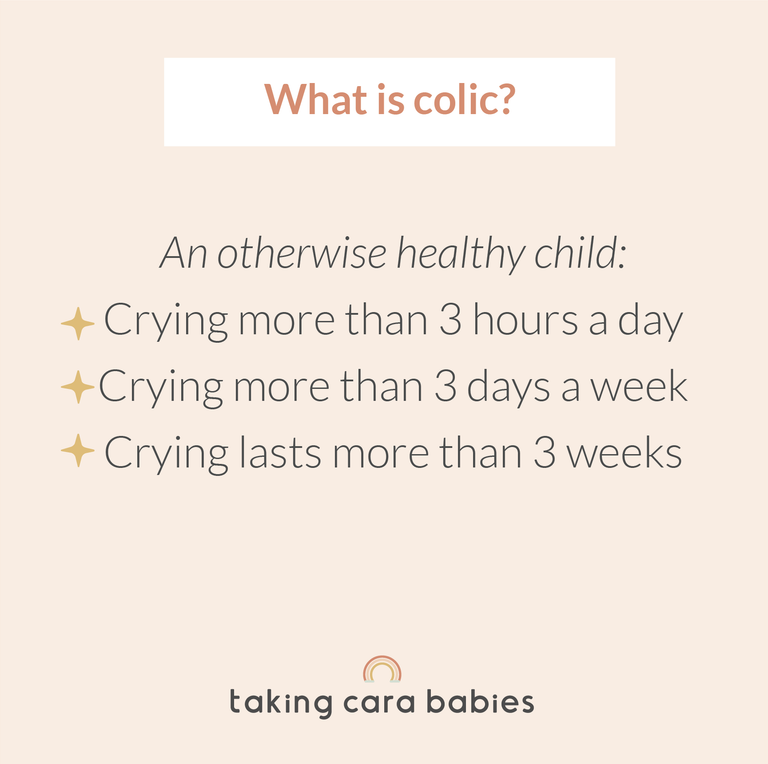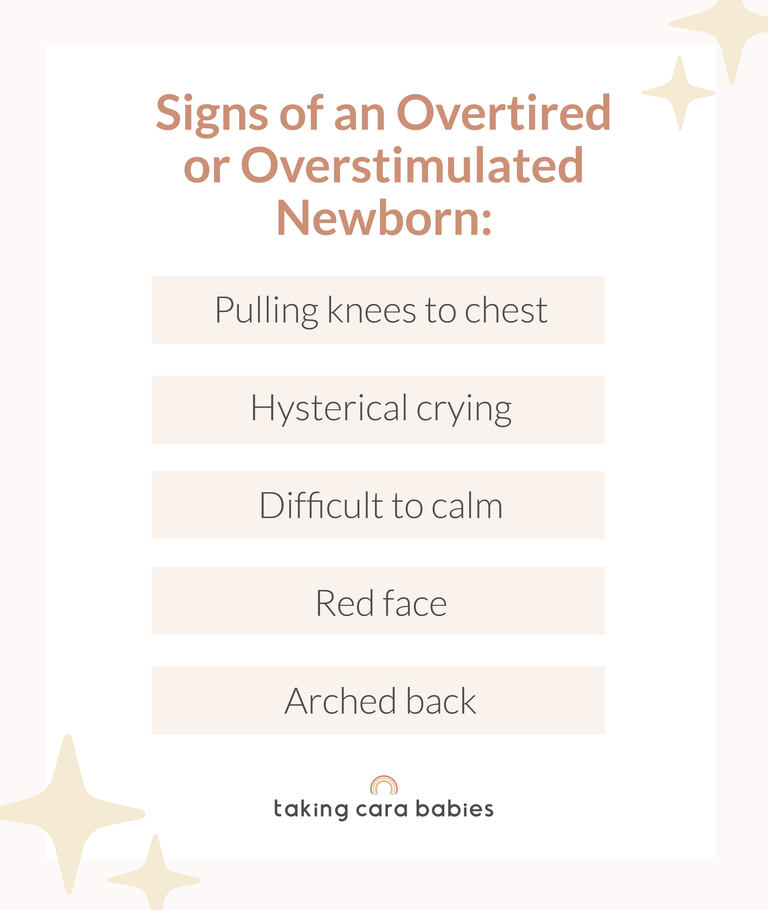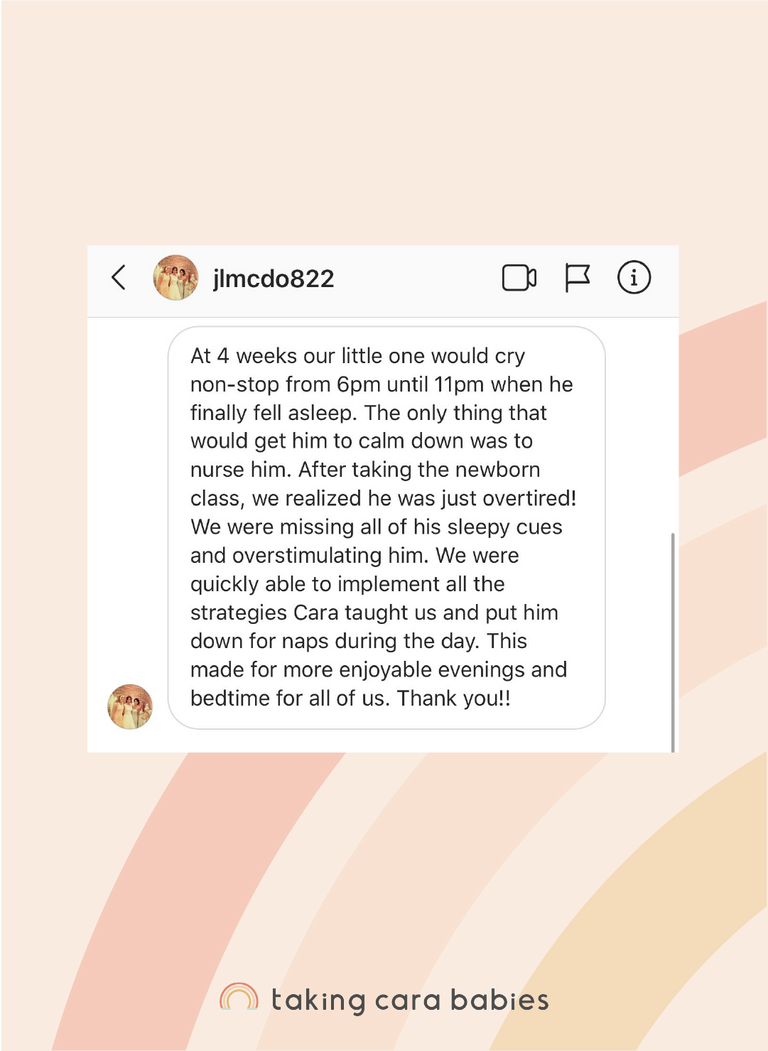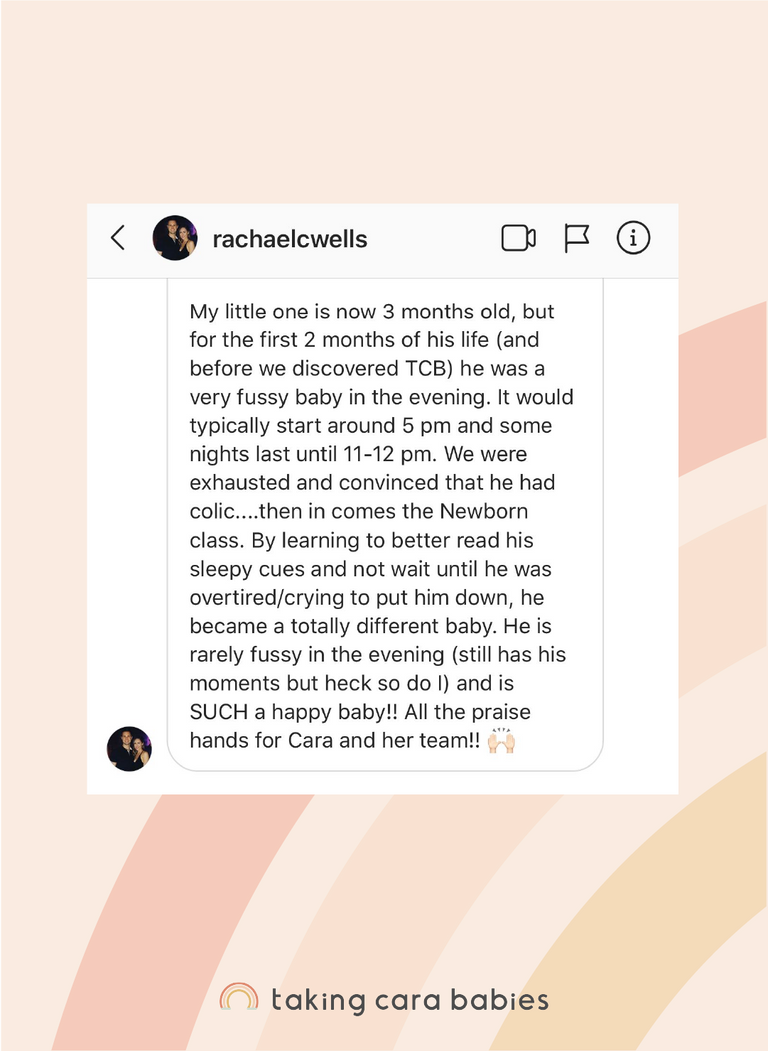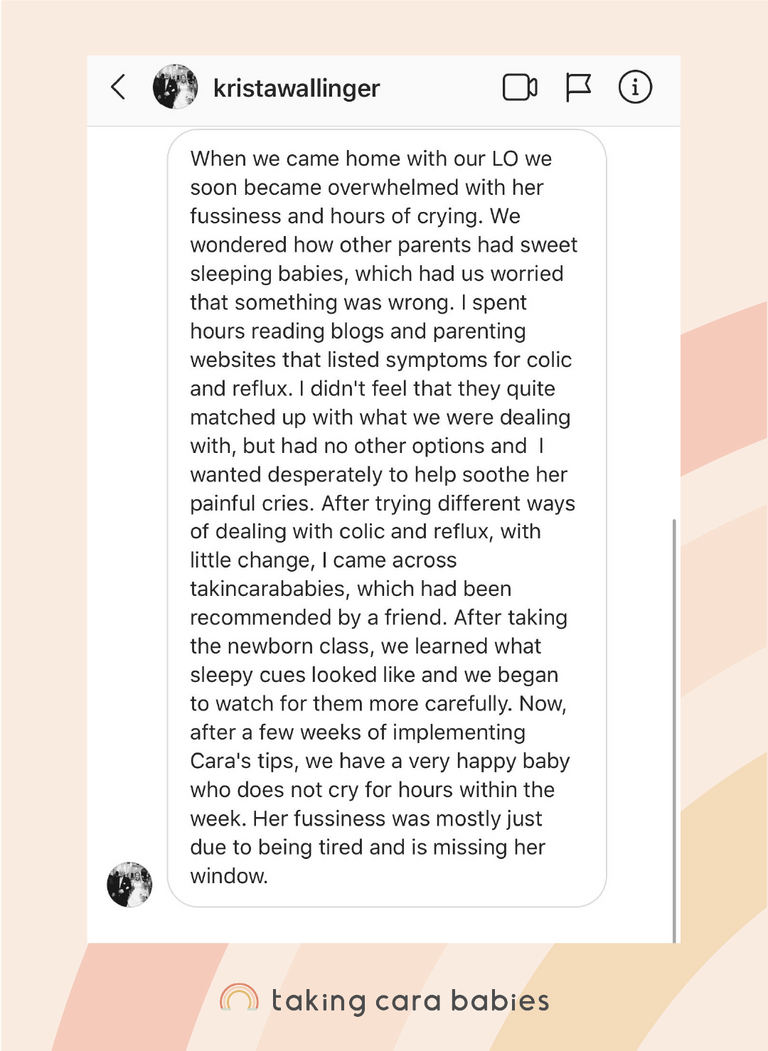Do you have a baby who seems to fuss and cry all the time? Let’s talk about whether your baby is experiencing the witching hour, colic, or something else entirely.
But before I dive in, can I tell you a secret? I know so many families who have a fussy, crying, “colicky” baby only to discover that they simply needed the tools to read their baby’s cues, to calm their fussy baby, and to prevent an overtired newborn. Once they implemented the strategies from my newborn class, their baby’s “colic” and witching hour seemed to mostly– or even fully– disappear. You can see what those parents had to say here.
What is the witching hour for babies?
The witching hour(s) is a time when an otherwise content baby has an extremely fussy period, often occurring daily between the hours of 5:00 and 11:00 pm. Calming methods that work during other parts of the day don’t seem to help as much during this time.
We typically see this fussiness beginning around 2-3 weeks, peaking at 6 weeks, and resolving by 3-4 months.
A note about fussiness and crying: If you have any concerns about your baby’s health (like physical discomfort, weight gain, or reflux), be sure to talk to your baby’s doctor.
How is the witching hour different from colic?
You may be wondering if your baby is experiencing the witching hour or colic. The truth is that these terms for frequent and long-lasting fussiness or crying are both very similar and overlap in many ways.
Here are the definitions of each:
Do you see how similar these “classifications” are? In reality, the way we address each is the same (unless you’re seeing a baby who never seems to be content). I know how difficult it can be when your baby is experiencing the witching hour or colic, but I want to reassure you that it will get better! I have tips for how to help your baby (and you) during these tough periods when your newborn is fussy and crying in the evening.
Expert Tip: If it seems like your baby frequently struggles to settle, seems uncomfortable, or is never calm, please talk with your pediatrician.
How do I know if my baby is crying too much?
During the newborn months, crying is the only way your baby can let you know they need something. Now, there will be times when your baby’s diaper is clean, they’ve just been fed, they’ve had great naps all day, yet they still cry. Occasionally crying for no apparent reason can be a normal part of being a newborn.
But, there are also times when crying could be a sign that something more is going on. Please check with your pediatrician if your baby is sick, seems to never be content, or experiences other symptoms like:
-
Vomiting
-
Fever
-
Decreased appetite
-
Diarrhea
-
Difficulty waking or lethargy
Remember, nobody knows your baby better than you. If you have any concerns at all about your baby, I want to encourage you to talk with your pediatrician.
Why is the witching hour happening for my baby? Why does my newborn get fussy at night but not during the day?
Often, babies experience a peak in fussiness and crying around 6-8 weeks. While this is a normal part of newborn development, here are some culprits that may make fussiness more likely:
Your baby is overtired: Newborns from birth to 12 weeks can become overtired quickly. This is extremely common, especially in the late afternoon/evening. When babies get overtired, cortisol and adrenaline are released into the bloodstream, essentially putting a baby in fight-or-flight mode. This makes falling asleep nearly impossible when babies need it most, and then the never-ending cycle of crying begins. You can help avoid overtiredness by following your baby’s sleepy cues and wake windows.
Your baby is overstimulated: Life outside of the womb is extremely stimulating compared to what your baby was used to inside the womb… especially in the later hours of the day. Think about what’s happening in your home during this time: parents coming home from work, older siblings coming home from activities, dinner preparations, etc.. This hustle and bustle can send your newborn’s immature nervous system into overdrive, and the crying cycle of the witching hour for your baby begins. What can you do? Dim the lights and reduce the noise. Turn off the TV, put down your phone, and even consider hanging out with your baby away from the commotion for a few minutes.
Your baby is uncomfortable: Sometimes gas can make it hard to settle as your newborn’s body is learning how to eat and digest. Burping during and after feedings and using a pacifier can help. You can also try bicycling your baby's legs and pumping your baby's knees to their chest to help that gas escape. Food intolerances and reflux symptoms can also cause discomfort. If it feels like your baby is never calm or is always difficult to settle, I want you to talk with your pediatrician.
Your baby is hungry: Babies who normally nurse every 2-3 hours all day long may want to eat more frequently during the evening. That’s okay! This doesn’t mean you have a milk supply issue. Your flow can be slower during this time of day, so try your best to stay relaxed, and the milk will let down. This happens for bottle fed babies too and is often known as cluster feeding.
How do you help with the witching hour for babies? What can I do about colic?
1. Watch this video!
It will show you one of my favorite techniques for soothing a fussy baby during the witching hour. It’s so calming for your baby AND for you!
2. Go outside.
Babies feed off the emotions of their caregivers. If we are stressed and frazzled, they feel it. If we are calm, they often relax into our arms.
In the hectic evening hours, sometimes just going outside can make a huge difference. It can help take the focus off of responsibilities inside the home and allow you to just breathe. That calmness that fills you when you get outside can calm your baby as well. Your slower heartbeat, deep breaths, and a clear head can directly impact your baby as your baby mimics your emotional state.
As an added benefit, exposure to daylight in the late afternoon and early evening can also help your baby to sleep better at night.
3. Use motion.
Inside the womb, your baby was rocked and swayed anytime you were walking. This was so soothing to your little one! Try babywearing or using a baby swing. That motion may be exactly what your baby needs to get through the witching hour. (Be sure to buckle your baby in as directed and always keep an eye on your baby in the swing.)
4. Offer a pacifier.
If you've already offered a feeding and your newborn is still fussy, consider offering a pacifier. Sometimes newborns have a drive to suck even when they’re not hungry. Non-nutritive sucking, (sucking without gaining nutrition or calories) promotes relaxation and provides comfort. Using a pacifier can also ease some of the discomfort from reflux if this is contributing to fussiness during the witching hour.
5. Get in the bath together.
Grab a washcloth, strip yourself and your baby, and hop in the tub. The sound of running water can instantly calm some fussy babies. Place your baby on your tummy/chest and lay a warm washcloth on top of the baby’s back. Make sure the water is high enough to keep your baby warm.
This is a trick I used all the time, sometimes a few times in one evening to handle the witching hour with my babies. I could feel myself AND my baby relax. Try it. You both may love it.
6. Darken the room and turn on the sound machine.
Being overstimulated is a common culprit of fussiness in the evening for newborns. Truthfully, many adults experience this too- there’s a lot going on during those evening hours! Moving to a dark room or darkening the room (use code: Cara) and adding the consistent hum of a sound machine (use code CARA20) can help.
7. Swaddle your baby.
A swaddle can be a great tool for calming a fussy newborn. Swaddling gives your newborn a feeling of comfort and security similar to the snugness inside the womb. A study from the American Academy of Pediatrics found that swaddling calms babies and alleviates discomfort.(1) If you need help with swaddling, I’d love to walk you through how to swaddle a baby. Please keep in mind that once your baby shows signs of rolling, it’s no longer safe to swaddle.
Expert Tip: Feel like your baby hates the swaddle? My newborn class will walk you through exactly what to do to turn your swaddle hater into a swaddle lover.
8. Have a plan.
My newborn class will give you the tools you need to handle and even prevent these fussy times while you set your days and nights up for success. Let me show you how to lay a healthy sleep foundation for your baby and love the newborn stage. Read these reviews to see what parents had to say after the took the newborn class.
What do I do if my baby won’t stop crying and I’ve tried everything?
I’ve been there. I know the feeling of exhaustion when you’ve tried everything to calm your fussy baby, but they’re having such a hard time. Here are my tips for helping you when your newborn is fussy in the evening, and it feels like nothing is working:
Ask for help.
People WANT to help you.
It’s difficult to imagine that someone may want to come hold your fussy baby during the witching hour. After all, this is YOUR baby, and you may not even want to do it sometimes. Why would someone else want to come help you in this way? Isn’t this too much to ask?
Please hear me: No. It’s not. Your loved ones WANT to help you. And honestly, the cry of your baby is uniquely distressing to you. For an outsider, this simply does not feel as overwhelming. Not only did your loved one get a good night’s sleep last night, but they’re also going to leave after helping you and go home to a quiet house.
Asking for help does not make you “too much” or “too needy.” It makes you human. And the people who love you would love the chance to serve you in this way.
So next time your dad, friend, aunt, or neighbor asks, “Is there anything I can do to help?” Respond with this: “Yes, would you come over at 8:00 pm tomorrow night and hold my baby while I ______ ?“ (Fill in the blank with something that sounds heavenly for you to do.)
Have a plan if you’re overwhelmed.
If you’re feeling frustrated or angry, set your baby down in the crib and step onto your balcony, walk out on the front porch, or stand on the back patio.
Ok, now point to four round objects. Stop and breathe. Look for four round things. Name them aloud. “A tire, a rock.” What else do you see? A round wreath on your door?
Why do this? It switches gears in your brain and helps you think clearly.
Now, find four green things, four different colored cars, four different types of trees, or four different “anythings.” Point to them. Say them aloud.
This works. Your brain is calming. Breathe in deep. Exhale slowly. Do it again. Now again. Four more times.
Are you calm? Now go in and get your baby. (Right after you read my next tip.)
Repeat this aloud: “There is no better parent on the planet for this baby than me. No one could do it better. No one!”
Your baby crying is not a reflection of you. She doesn’t hate you; she ADORES you. He doesn’t wish for a better parent; you ARE the best in the world for him.
This is just a phase. That nervous system is immature. This witching hour or colic stage WILL pass.
You’ve got this!


